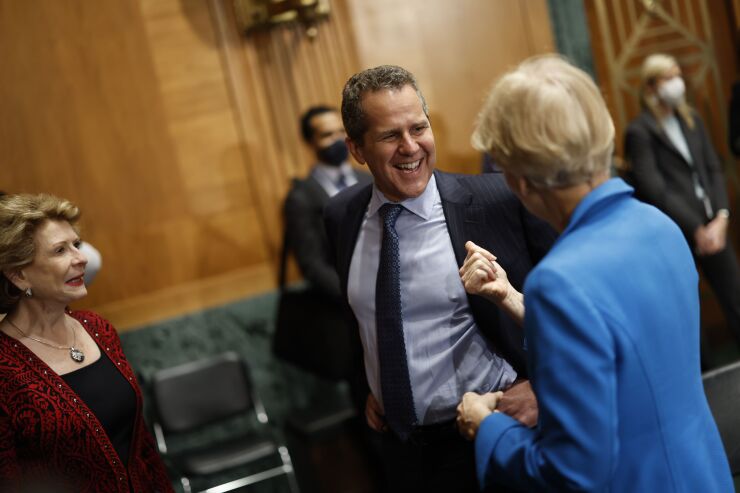WASHINGTON — Michael Barr, the White House’s pick for the top regulatory position at the Federal Reserve, sailed through the Senate Banking Committee’s approval process by a vote of 17-7 Wednesday afternoon.
Five Republicans on the committee,

Along with those Republicans, Barr has also secured the support of centrist Democrats who have broken from the party on nominees and policy objectives in the past. Sen. Joe Manchin, D-W.Va., who
Barr is all but assured confirmation in a Senate-wide vote later this summer. A date for that vote has not yet been set.
The focus will now shift toward what Barr will do with the position. The former Treasury official and current dean of the University of Michigan's Gerald R. Ford School of Public Policy will inherit a
Derek Tang, co-founder of the Washington-based research firm Monetary Policy Analytics, said he expects Barr to move swiftly to address regulatory issues that have been on the backburner. Those include addressing the countercyclical capital buffer, which has not been voted on for more than a year, and updating the supplementary leverage ratio, which the Fed acknowledged as needing recalibration last March.
“Barr has said on record that he wants to get that done, not immediately, but he doesn't want to wait years to get that done,” Tang said of the SLR. “So we should probably expect progress on that in the next six to 12 months.”
The other top issue on Barr’s plate will be joining the Office of the Comptroller of the Currency and the Federal Deposit Insurance Corp. in reforming standards for bank mergers. Tang said he expects Barr to take a more moderate view than other Democrat-nominated Fed governors, including Vice Chair Lael Brainard and Gov. Lisa Cook, because of his understanding of where the “pain points” are in the industry.
Barr’s experience working with the private sector — both as an advisor and as a partner during his tenure at the University of Michigan — will position him well to coordinate on initiatives such as the implementation of the final aspects of the Basel III international regulatory framework, Tang added.
“Barr is a very good coordinator and he has very good relations with the private sector,” he said. “At the University of Michigan, he actually had fairly close contact with the private sector as well. … The school was the beneficiary of a lot of private donations and goodwill, for example. And so there's a lot of good relations and goodwill between them. That will be an asset that's used for this effort.”
If confirmed, Barr will be the fifth and final Biden nominee installed to the Fed Board of Governors, giving the seven-member board a full complement of governors for the first time in
Kathryn Judge, a law professor at Columbia University, said having a full slate of Fed governors will be helpful for setting both supervisory and monetary policy. But, she noted, it will be difficult for the Biden administration to achieve all of its policy objectives until it has permanent leadership in place at the other prudential regulators as well.
“We still have acting leadership in place at both the FDIC and OCC,” Judge said. “And while those leaders are exceptionally competent, their status does create some limitations in their ability to lay out and implement a longer-term vision for maintaining the health of the banking system and responding to new threats. This would be unfortunate at any time, and is all the more so given the current challenges, including inflation.”
Before the vote, Sen. Bob Menendez, D-N.J., criticized the Biden administration for not putting forth a nominee of Hispanic descent. He noted that the Fed has never had a governor or a reserve bank president of Hispanic origin despite that group accounting for more than 18% of the population and $2.3 trillion of gross domestic product.
Despite his frustrations, Menendez said he was persuaded to support Barr because of assurances he made to update the recruitment and hiring process at the central bank to improve representation.
“I’m going to vote for Mr. Barr because he made a personal commitment to at least pursue a process that can create the opportunity for Hispanic Americans to be considered,” Menendez said. “There’s no guarantees that person would be appointed, but to create a process which the Federal Reserve itself should adopt as a whole in order to break this century-plus period of time in which no one from our community, despite a $2.3 trillion domestic marketplace, ultimately has a say.”






